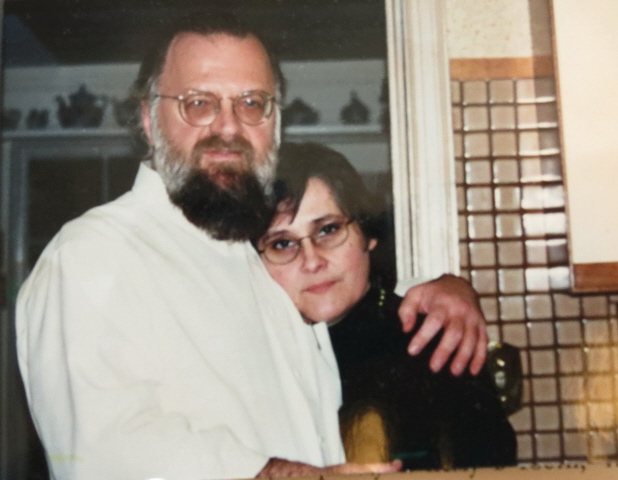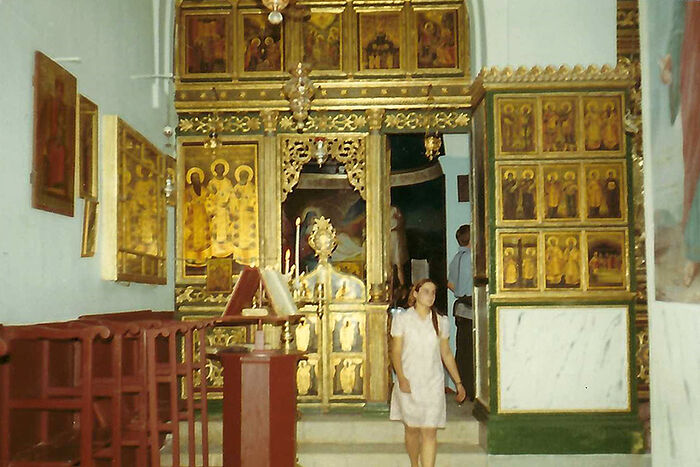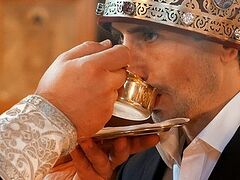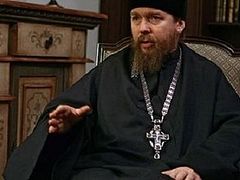The rector of the Church of St. John the Baptist in Washington, D.C., Archpriest Victor Potapov and his wife Maria are probably known by all of Russian Orthodox America. They play an important role in the life of not only their parish, but the entire Church community—they help Russians living in the U.S. to keep the fire of the Orthodox faith in their hearts, and Americans—to light it. If someone needs not only spiritual, but also moral, physical, or material help—they always seem to be nearby.
On August 29, Fr. Victor and Matushka Maria celebrated their golden 50th anniversary. But this joyous occasion might not have happened, had the Lord and the Most Holy Theotokos not brought this Russian-American man and Russian-French woman to the Holy Land a year before their wedding.
You could see the beginning of this family as just a series of coincidences, but according to St. John of Shanghai and San Francisco, whom Maria knew well in childhood, there are no coincidences in the life of an Orthodox Christian. Matushka grew up under Vladyka John, as her father, Archpriest Sergei Chertkov, served as his protodeacon for eleven years. By the way, it was Vladyka John who founded the parish that Fr. Victor has been heading for more than forty years now, and this is also no coincidence.
 Archpriest Victor Potapov with his wife Maria
Archpriest Victor Potapov with his wife Maria
In 1970, I was a third-year seminarian at Holy Trinity Seminary in Jordanville and I went to Mt. Athos. The summer was our free time; I was dreaming of seeing the Holy Mountain, and I ended up staying more than a week, visiting various monasteries. The monks of St. Elias Skete invited me to come to Mt. Athos for a whole year to get to know the monastic life, statutes, and traditions better. I really liked this idea. By the way, on Mt. Athos I met Fr. Iliy (Nozdrin), who later became the spiritual father of His Holiness Patriarch Kirill, and Archimandrite Abel (Makedonov), the abbot of St. Panteleimon’s Monastery on the Holy Mountain. This was my first encounter with clergy of the Moscow Patriarchate, which made an indelible impression on me.
However, after Mt. Athos I first went to Jerusalem, where I joined a group of pilgrims from New York headed by then-Bishop Laurus (Škurla)—the future Metropolitan and First Hierarch of the Russian Church Abroad. The trip coincided with the feasts of the Transfiguration of the Lord and the Dormition of the Most Holy Theotokos. I was twenty-one then, quite young, and it felt like I was in an old timers’ group, although these “old timers” were only forty or fifty. But when you’re barely over twenty, people twice as old sometimes seem elderly.
At the same time, another group came to Jerusalem from Paris, with some Russian Orthodox young people. Sometimes our schedules for visiting the holy sites lined up. And then, on the feast of the Transfiguration, we prayed at the Russian Holy Ascension Monastery in Jerusalem, and after lunch we headed north, to Galilee, to Mt. Tabor, to pray in the Orthodox church on the site of the Lord’s Transfiguration.
There, in the Greek church, on the feast of the Transfiguration, women are allowed to go into the altar and venerate the spot where the Lord was transfigured.
The youth group from Paris was there at the same time as us. One of the pilgrims took a photo of me entering the altar through the deacon’s door, and there’s a girl coming out the same door—young Maria Chertkova. We didn’t know each other then, so we just passed each other by.
As it turned out, Maria took notice of me—but unfortunately, I didn’t notice her. I was living with the idea of returning to Athos then, to spend a year there, and I was even thinking that perhaps monasticism was the path for me. But later when we met, these “monastic” thoughts of mine disappeared. It turns out the Lord and the Most Holy Theotokos had chosen a different path for me.
A few days later, we were introduced to each other on the forefeast of the Dormition of the Most Holy Theotokos, before the start of the nighttime Liturgy at the Holy Sepulchre in Jerusalem. A year later, we were married, in America. It happened in Cleveland, on August 29, the day after the Dormition. The wedding was served by Maria’s father, her uncle—Archpriest Vladimir Rodzianko (the future bishop)—and my spiritual father, Archpriest Mikhail Smirnov.
Several months later, on January 1, 1972, the then-First Hierarch of the Church Abroad, Metropolitan Philaret, ordained me to the diaconate, and in 1974, to the priesthood. I’ve been serving as a priest since then, with God’s help. Or rather, my wife and I serve God and the people. Without her, I wouldn’t have any kind of success. I remember how Archpriest Vladimir Rodzianko said during a pre-marriage conversation with us just before our wedding that on the day of a man’s ordination to the priesthood, his wife is as if ordained along with him. Over the course of the fifty years of my pastoral ministry, I’ve become convinced of the truthfulness of his words. Without my wife’s help, I couldn’t have carried out my ministry in a worthy manner. Glory to God for His mercy and for everything!





